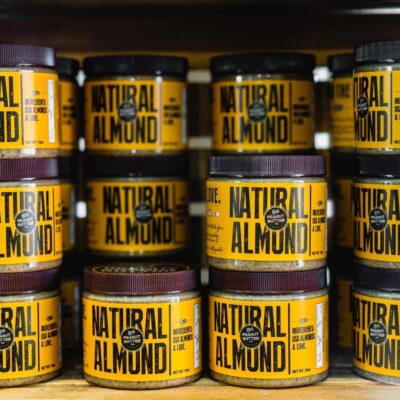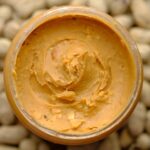Yes, dogs can safely eat almond butter provided it has no harmful additives, such as sweeteners, preservatives or salt. However, almond butter is high in calories. Therefore, it should be fed to dogs only as an occasional treat.

Caution: This food is generally considered risky by the veterinary community. Dogs should not eat this food and should be monitored for adverse effects.
| Food Safety | Safe without any additives and should only be given as a treat from time to time. |
|---|---|
| Nutritional Value | Almonds are an excellent source of calcium, antioxidants, vitamin E, and other minerals. Almond butter has a high fat content. |
| Potential Risks | Some dogs cannot digest almonds properly. Therefore, they can have intestinal discomfort, bloating, and diarrhea after eating almond butter. Feeding commercially made almond butter with xylitol can be toxic to your dog. Xylitol poisoning can lead to liver failure and hypoglycemia and can be lethal in severe cases. Eating an excess amount of almond butter through the years can lead to weight gain and other health complications among dogs. |
How Much Almond Butter is Safe for Dogs?
While almonds are nutritious nuts, most of the calories in almond butter come from fat. Unprocessed almond butter contains mostly good fats, but even those can become fattening if consumed in excess. This is why almond butter should only be given to your dog as an occasional treat rather than making it a regular part of its diet. A small spoonful mixed with dog food or given on its own is enough to satiate your furry friend without any worries about weight gain.
Be mindful that almond butter sweetened with xylitol is unsafe for your dog. Therefore, read the label carefully before feeding your dog commercial almond butter.
What Happens if Your Dog Eats Too Much Almond Butter?
If your dog eats too much plain almond butter, chances are that it will only lead to digestive issues that you can treat at home. If your dog’s digestive system cannot digest the almond, your dog is like to have acute gastrointestinal discomfort, diarrhea, and even vomiting. Depending on the severity of your dog’s condition, you may need medical intervention to treat the digestive problems.
How to Safely Prepare Almond Butter for Your Dog
The best kind of almond butter that you can give to your dog is the one you prepare at home. Commercially available brands of almond butter tend to have preservatives and additives, such as sweeteners, that can harm dogs.
High sodium content in these kinds of butter is also an issue. Prepare completely plain organic almond butter for your dog and gradually introduce it to your dog. Quick tip: adding a small spoon of almond butter to your dog’s regular food helps introduce it.
Frequently Asked Questions
-
A tablespoon of almond butter is enough for larger dog breeds like German Shepherds. Be mindful that this portion should only be given infrequently as a treat.
-
Almond butter is more nutritious than peanut butter; therefore, it might be considered a healthier treat for dogs.







